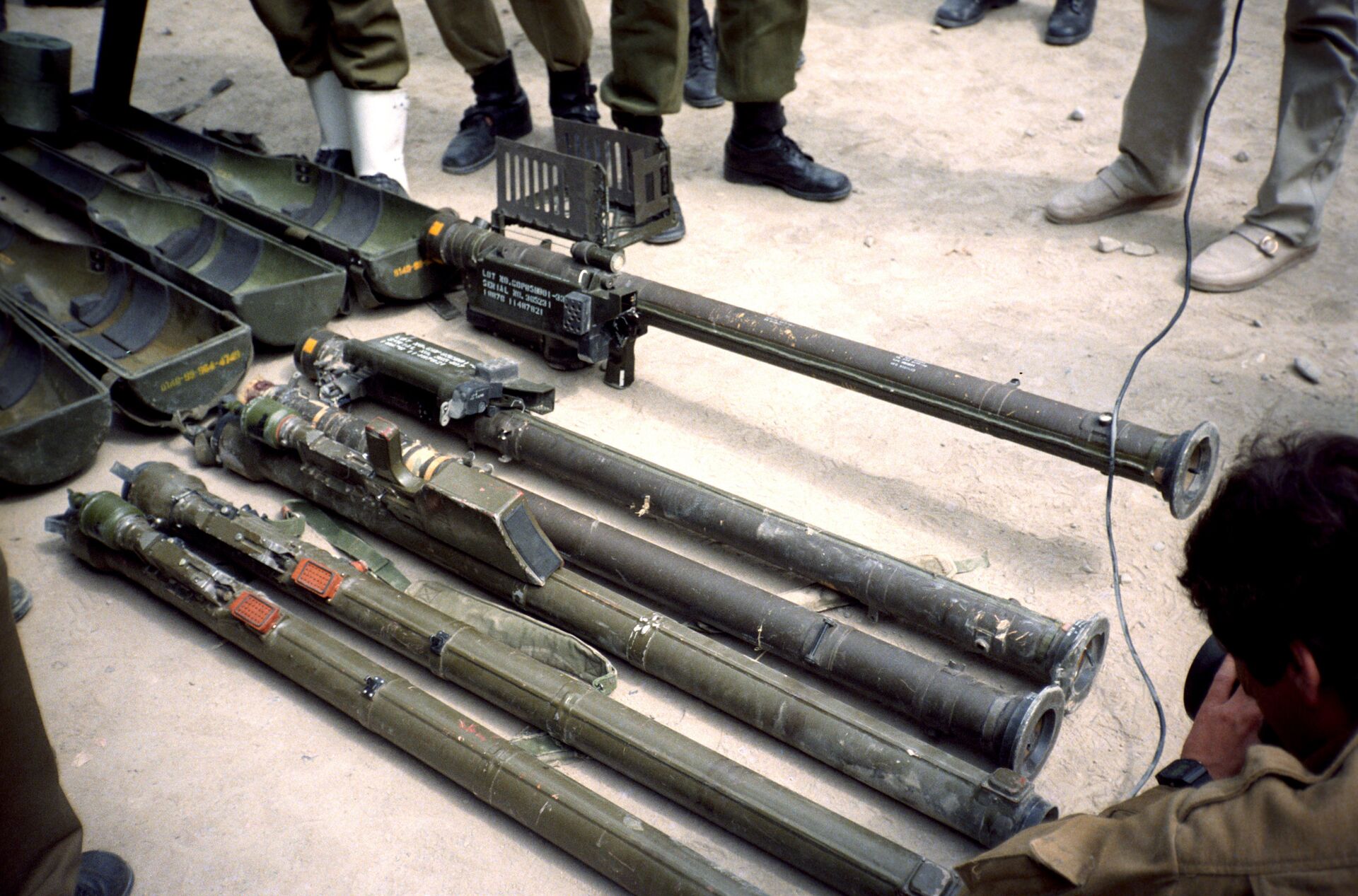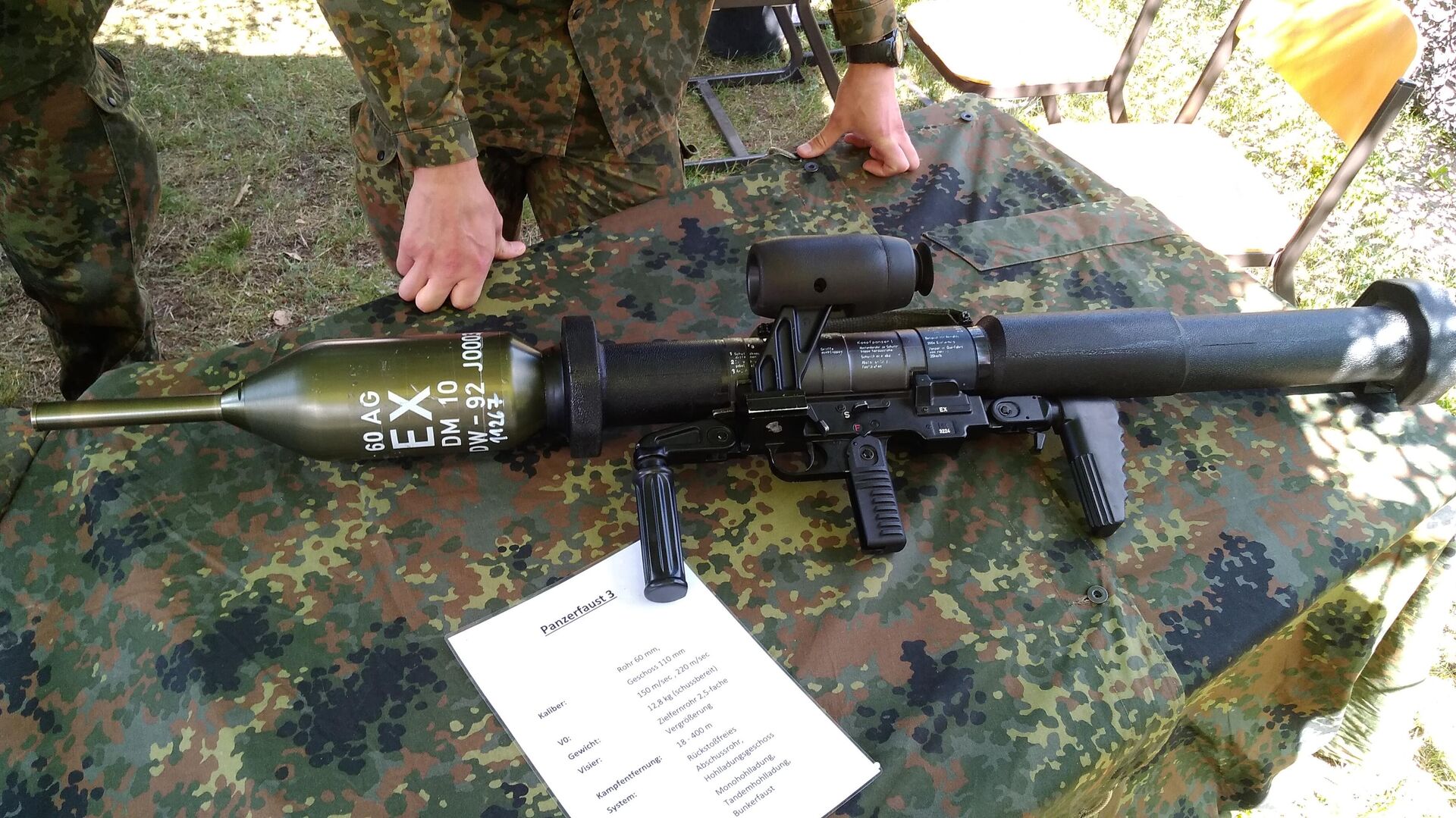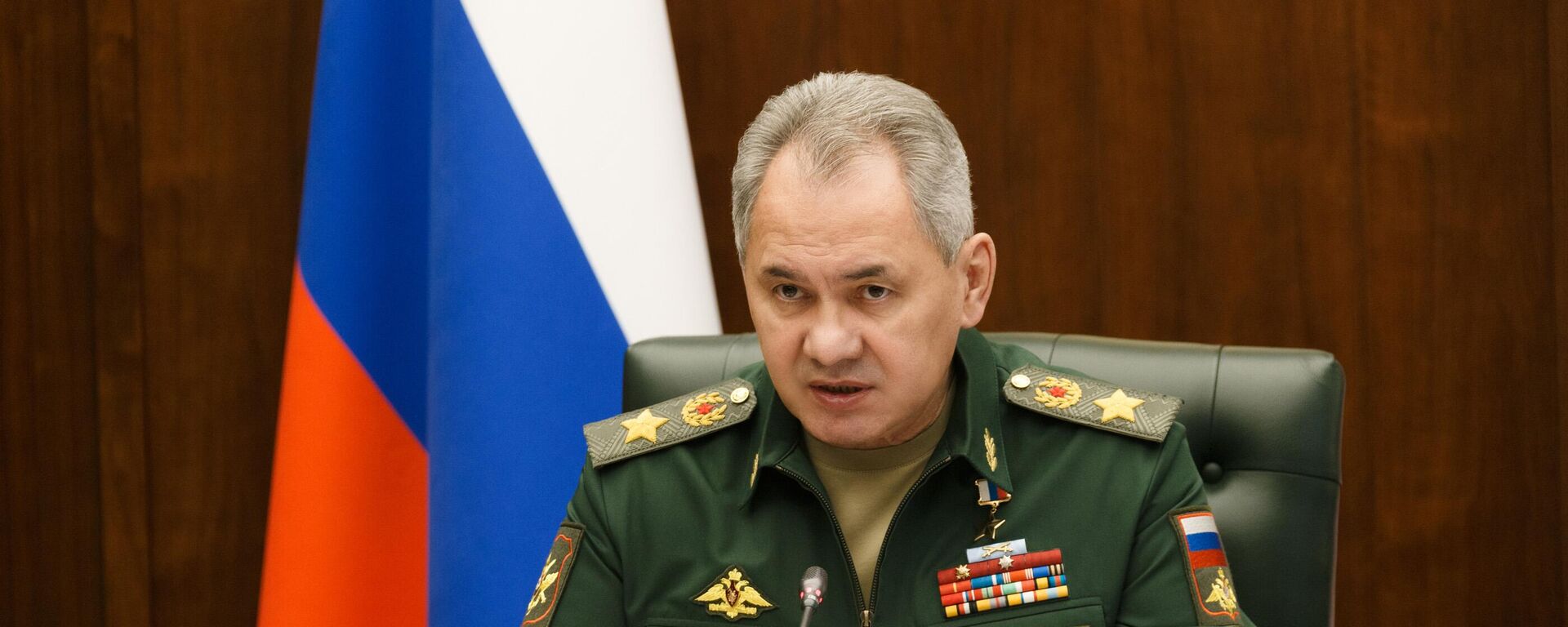https://sputnikglobe.com/20220402/bundeswehr-reportedly-asking-govt-for-21mln-to-restock-in-panzerfaust-3-after-ukraine-deliveries--1094414859.html
Bundeswehr Reportedly Asking Gov't For €21Mln to Restock in Panzerfaust 3 After Ukraine Deliveries
Bundeswehr Reportedly Asking Gov't For €21Mln to Restock in Panzerfaust 3 After Ukraine Deliveries
Sputnik International
Berlin had earlier U-turned on its decades-old policy of not sending lethal weapons to crisis regions, when German Chancellor Olaf Scholz announced that... 02.04.2022, Sputnik International
2022-04-02T07:29+0000
2022-04-02T07:29+0000
2022-11-03T19:04+0000
germany
ukraine
bundeswehr
stinger missiles
strela
volodymyr zelensky
sergei shoigu
https://cdn1.img.sputnikglobe.com/img/07e6/04/02/1094415285_227:0:3868:2048_1920x0_80_0_0_e9039d320b4460977bdd410f3f39a0cf.jpg
The Bundeswehr has underscored the need to urgently replenish its ammunition after deliveries made to Ukraine drained its own stockpiles, reported Spiegel.This week the German defense department requested a special budget of 21 million euros from the Bundestag in order to top-up the stocks of ammunition for the "Panzerfaust 3" (PF3) shoulder-fired, unguided antitank launchers. The PF3 consists of a disposable canister with a 110-mm warhead and reusable firing and sighting device. The projectile consists of a warhead filled with Octol 7030 high explosive mixture.According to a cited confidential submission, it is planned to replace the 3,500 cartridges delivered to Kiev forces “at short notice" so that the "current need for cartridges can be replenished".Furthermore, a warning was reportedly issued that unless the stockpiles are replenished, Germany's security interests would be "considerably endangered."The urgency of the request, according to the publication, illustrates how poorly the Bundeswehr is equipped with weapons for national and alliance defense requirements. According to Spiegel, before the Ukraine crisis, Germany had around 24,000 Panzerfaust 3 units. After the government's about-face in the matter of arms deliveries to Ukraine, the military has reportedly been scrambling to optimally equip its own troops.Russia launched its operation to demilitarize and de-Nazify Ukraine on 24 February, after the Donetsk and Lugansk People’s Republics (DPR and LPR) appealed for assistance amid increasing attacks from Kiev forces.Since then, the German government found itself under pressure to join the US and UK, as well as several other countries, in announcing the shipment of lethal defensive weapons to Ukraine.While originally invoking its legislation that bans the delivery of arms to conflict regions, as well as rules that give it a veto on the reselling of German-made armament by third parties, Germany caved to the pressure.German Chancellor Olaf Scholz announced a U-turn, pledging to send weapons to Ukraine.The Kremlin has underscored that the goal of its operation is to exclusively target military infrastructure of the country, while having no plans of occupying Ukraine.As a result of the reversal of its earlier policy, Germany sent 3,500 models of the Panzerfaust 3, 500 "Stinger" systems, 2,000 East German-era Strela anti-aircraft missiles, as well as machine guns and the associated ammunition. According to Christine Lambrecht, a politician of the Social Democratic Party (SPD) who is the Federal Minister of Defence in the government of Chancellor Olaf Scholz, options for further deliveries have been exhausted.Lambrecht, said the outlet, is currently under pressure like no other member of the government, facing almost daily critical voices from Ukraine criticizing the speed and extent of the German arms deliveries.Ukraine’s President Volodymyr Zelensky, frustrated by the slow pace of weapons supplies, called on NATO to send tanks and aircraft to his country, in addition to the anti-tank and anti-aircraft weapons that have already become a hallmark of Western armament supplies to Kiev.According to the Russian Ministry of Defence, since the launch of the special military operation in Ukraine, the country's military, along with the Donbass republics, has destroyed more than 1,800 tanks and other armored fighting vehicles of the Ukrainian army, 81 percent of Ukrainian military aircraft (124 out of 152), half of the Kiev regime’s helicopter fleet. According to Russian Defence Minister Sergei Shoigu, Russia has completed the main objectives of the first phase of the special military operation in Ukraine.The combat potential of the Ukrainian armed forces has been significantly reduced and now Russian forces can focus on achieving the main goal, "the liberation of Donbass", Shoigu stated during a meeting at the Defence Ministry.The Russian minister noted that the Ukrainian Air Force and air defences have been “practically eliminated” and its Navy “ceased to exist” following the start of the operation.
https://sputnikglobe.com/20220328/germany-warns-display-of-z-to-back-russian-special-op-in-ukraine-may-be-liable-to-prosecution-1094267379.html
https://sputnikglobe.com/20220329/russian-defence-minister-russia-reached-main-goal-of-first-phase-of-special-operation-in-ukraine-1094286774.html
germany
ukraine
Sputnik International
feedback@sputniknews.com
+74956456601
MIA „Rosiya Segodnya“
2022
News
en_EN
Sputnik International
feedback@sputniknews.com
+74956456601
MIA „Rosiya Segodnya“
Sputnik International
feedback@sputniknews.com
+74956456601
MIA „Rosiya Segodnya“
germany, ukraine, bundeswehr, stinger missiles, strela, volodymyr zelensky, sergei shoigu
germany, ukraine, bundeswehr, stinger missiles, strela, volodymyr zelensky, sergei shoigu
Bundeswehr Reportedly Asking Gov't For €21Mln to Restock in Panzerfaust 3 After Ukraine Deliveries
07:29 GMT 02.04.2022 (Updated: 19:04 GMT 03.11.2022) Berlin had earlier U-turned on its decades-old policy of not sending lethal weapons to crisis regions, when German Chancellor Olaf Scholz announced that Germany would send missiles and anti-tank weapons to help Ukraine amidst the ongoing Russian operation to "demilitarise and de-Nazify" the country.
The Bundeswehr has underscored the need to urgently replenish its ammunition after deliveries made
to Ukraine drained its own stockpiles, reported Spiegel.
This week the German defense department requested a special budget of 21 million euros from the Bundestag in order to top-up the stocks of ammunition for the "Panzerfaust 3" (PF3) shoulder-fired, unguided antitank launchers. The PF3 consists of a disposable canister with a 110-mm warhead and reusable firing and sighting device. The projectile consists of a warhead filled with Octol 7030 high explosive mixture.
According to a cited confidential submission, it is planned to replace the 3,500 cartridges delivered to Kiev forces “at short notice" so that the "current need for cartridges can be replenished".
Furthermore, a warning was reportedly issued that unless the stockpiles are replenished, Germany's security interests would be "considerably endangered."
"Appropriate weapons are important for Germany’s security policy interests, as in order to fully respond to national and alliance defense needs, the Bundeswehr should be able to effectively combat armored enemy forces,” the cited document stated.
The urgency of the request, according to the publication, illustrates how poorly the Bundeswehr is equipped with weapons for national and alliance defense requirements. According to Spiegel, before the Ukraine crisis, Germany had around 24,000 Panzerfaust 3 units. After the government's about-face in the matter of arms deliveries to Ukraine, the military has reportedly been scrambling to optimally equip its own troops.
Russia launched its
operation to demilitarize and de-Nazify Ukraine on 24 February, after the Donetsk and Lugansk People’s Republics (DPR and LPR) appealed for assistance amid increasing attacks from Kiev forces.
Since then, the German government found itself under pressure to join the US and UK, as well as several other countries, in announcing the shipment of lethal defensive weapons to Ukraine.
While originally invoking its legislation that bans the delivery of arms to conflict regions, as well as rules that give it a veto on the reselling of German-made armament by third parties, Germany caved to the pressure.
German Chancellor Olaf Scholz announced a U-turn, pledging to send weapons to Ukraine.
“It is our duty to support Ukraine to the best of our ability… That is why we are delivering 1,000 antitank weapons and 500 Stinger missiles to our friends in Ukraine,” said Scholz said in a statement in March.
The Kremlin has underscored that the goal of its operation is to exclusively target military infrastructure of the country, while having no plans of occupying Ukraine.
As a result of the reversal of its earlier policy, Germany sent 3,500 models of the Panzerfaust 3, 500 "Stinger" systems, 2,000 East German-era Strela anti-aircraft missiles, as well as machine guns and the associated ammunition. According to Christine Lambrecht, a politician of the Social Democratic Party (SPD) who is the Federal Minister of Defence in the government of Chancellor Olaf Scholz, options for further deliveries have been exhausted.
Lambrecht, said the outlet, is currently under pressure like no other member of the government, facing almost daily critical voices from Ukraine criticizing the speed and extent of the German arms deliveries.
Ukraine’s President
Volodymyr Zelensky, frustrated by the slow pace of weapons supplies, called on NATO to send tanks and aircraft to his country, in addition to the anti-tank and anti-aircraft weapons that have already become a hallmark of Western armament supplies to Kiev.
According to the Russian Ministry of Defence, since the launch of the special military operation in Ukraine, the country's military, along with the Donbass republics, has destroyed more than 1,800 tanks and other armored fighting vehicles of the Ukrainian army, 81 percent of Ukrainian military aircraft (124 out of 152), half of the Kiev regime’s helicopter fleet.
According to Russian Defence Minister Sergei Shoigu, Russia has completed the main objectives of the first phase of the special military operation in Ukraine.
The combat potential of the Ukrainian armed forces has been significantly reduced and now Russian forces can focus on achieving the main goal, "the liberation of Donbass", Shoigu stated during a meeting at the Defence Ministry.
The Russian minister noted that the Ukrainian Air Force and air defences have been “practically eliminated” and its Navy “ceased to exist” following the start of the operation.






